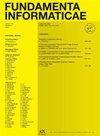Dynkin型非负单位形式的Coxeter不变量𝔸r
IF 0.4
4区 计算机科学
Q4 COMPUTER SCIENCE, SOFTWARE ENGINEERING
引用次数: 5
摘要
如果两个积分二次单位形式的上三角格拉姆矩阵是0 -同余的,则称为强格拉姆同余。本文在[Fundamenta informatice 184(1):49 - 82,2021]中引入的框架内,给出了Dynkin型的非负单位形式𝔸r(对于r≥1)的组合强Gram不变量,并用它来确定所有相应的Coxeter多项式和(约简)Coxeter数。本文章由计算机程序翻译,如有差异,请以英文原文为准。
Coxeter Invariants for Non-negative Unit Forms of Dynkin Type 𝔸r
Two integral quadratic unit forms are called strongly Gram congruent if their upper triangular Gram matrices are ℤ-congruent. The paper gives a combinatorial strong Gram invariant for those unit forms that are non-negative of Dynkin type 𝔸r (for r ≥ 1), within the framework introduced in [Fundamenta Informaticae 184(1):49–82, 2021], and uses it to determine all corresponding Coxeter polynomials and (reduced) Coxeter numbers.
求助全文
通过发布文献求助,成功后即可免费获取论文全文。
去求助
来源期刊

Fundamenta Informaticae
工程技术-计算机:软件工程
CiteScore
2.00
自引率
0.00%
发文量
61
审稿时长
9.8 months
期刊介绍:
Fundamenta Informaticae is an international journal publishing original research results in all areas of theoretical computer science. Papers are encouraged contributing:
solutions by mathematical methods of problems emerging in computer science
solutions of mathematical problems inspired by computer science.
Topics of interest include (but are not restricted to):
theory of computing,
complexity theory,
algorithms and data structures,
computational aspects of combinatorics and graph theory,
programming language theory,
theoretical aspects of programming languages,
computer-aided verification,
computer science logic,
database theory,
logic programming,
automated deduction,
formal languages and automata theory,
concurrency and distributed computing,
cryptography and security,
theoretical issues in artificial intelligence,
machine learning,
pattern recognition,
algorithmic game theory,
bioinformatics and computational biology,
quantum computing,
probabilistic methods,
algebraic and categorical methods.
 求助内容:
求助内容: 应助结果提醒方式:
应助结果提醒方式:


